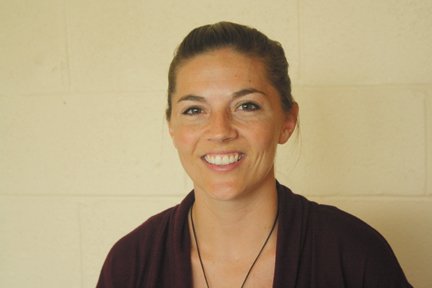When you walk in the MedQuest classroom at Marist High School, it doesn’t look like a classroom at all. The part you see first looks like the reception area for a doctor’s office, complete with a receptionist who asks you your name and whether you have an appointment.
Students, of course, learn how to meet and greet potential patients, how to deal with record keeping, billing, and all of the other skills associated with that aspect of the medical profession.
Moving through the next door, you will come into a room where students will greet you and take your vital signs. This room is equipped with an examination table and everything else that you would expect to find in an examination room – such as a scale and a blood pressure monitor. Students learn all the basics that a medical assistant might need to know by working in a doctor’s office, said Roxann D’Alessio, director of the MedQuest program.
“This will give students hands-on experience in clinical procedures.” – Roxann D’Alessio
____________
In the fourth part of this classroom, you encounter a model hospital room and everything that it would contain, such as a hospital bed, oxygen, IV pull, and other items.
“Students learn how to take care of the bed ridden, how to move them so that they won’t get bed sores, how to feed patients, and protocol for dealing with family members,” D’Alessio said.
Marist High School is ready to unveil its latest aid in helping students learn about medical professions, a new classroom which will duplicate the various environments students can expect to encounter when working in the medical profession.
This was possible due to a $100,000 grant from the J.C. Kellogg Foundation.
MedQuest is a medical and healthcare career exploration program that was inaugurated in September 2009 in a response to a growing demand for more classes focused on careers in the medical profession.
Graduates of the MedQuest program will be better prepared to apply for pre-medicine, nursing, pre-veterinary, pre-dentistry, and other allied health career preparation programs as college undergraduates.
“This will give students hands-on experiences in clinical procedures, such as how to wrap wounds, how to take vital signs, and how to interact with patients,” D’Alessio said.
Clinical experiences will include: bandaging, EKG usage, defibrillators, phlebotomy, vital signs, and bringing classroom theory into field experiences.
As of September, the MedQuest classroom went operational, serving as a functioning hospital room, complete with a waiting/reception area and examination stations for true “clinical” experiences.
Advisory Committee Chairperson Dr. Michael J. Polisin helped raised $41,000 to be used for various restricted gifts for the MedQuest program.
Future careers
Much of the program introduces freshmen into the practical side of medical services, followed up with career options later as they advance into other grades.
The program plans to bring in guest speakers, who will talk about the full range of possible medical career paths students can opt for – which will include every one from dentists and nurses, to chiropractors and pediatricians.
The goal is to get all of the students involved with the program CPR certified before leaving.
The MedQuest I class completed in June had about 30 students – a combination of freshmen and sophomores, with a waiting list of about 10. These students will move on into the next phase, while new students enter the program, which covers a range of issues such as health, physical education, CPR, and medical terminology.
A survey done about eight years ago, said Principal Alice Miesnik, showed that the three most popular career choices were medicine, criminal justice, and business, and the school adapted many of the class offerings to accommodate this need.
An official ribbon cutting on the classroom will be held in October, she said.
Helping to guide this program into the next phase will be Alexandra Cavell, who was recently named assistant principal for academics to fill in the position Miesnik held prior to being named acting principal of Marist. Miesnik was recently officially appointed as principal.
Also deeply involved in the program is the MedQuest advisory committee, including: Ivelisse Perez, R.N.; Jack McNally, D.D.S.; Renee Vales, R.N.; Angelo Alvarado, R.T.; Charles Gonzales, D.C.; Dr. Claudine Drew; and Chairperson Michael J. Polisin, M.D.
For more information on the MedQuest Program and Marist High School, visit www.marist.org or call (201) 437-4545, ext. 225.
